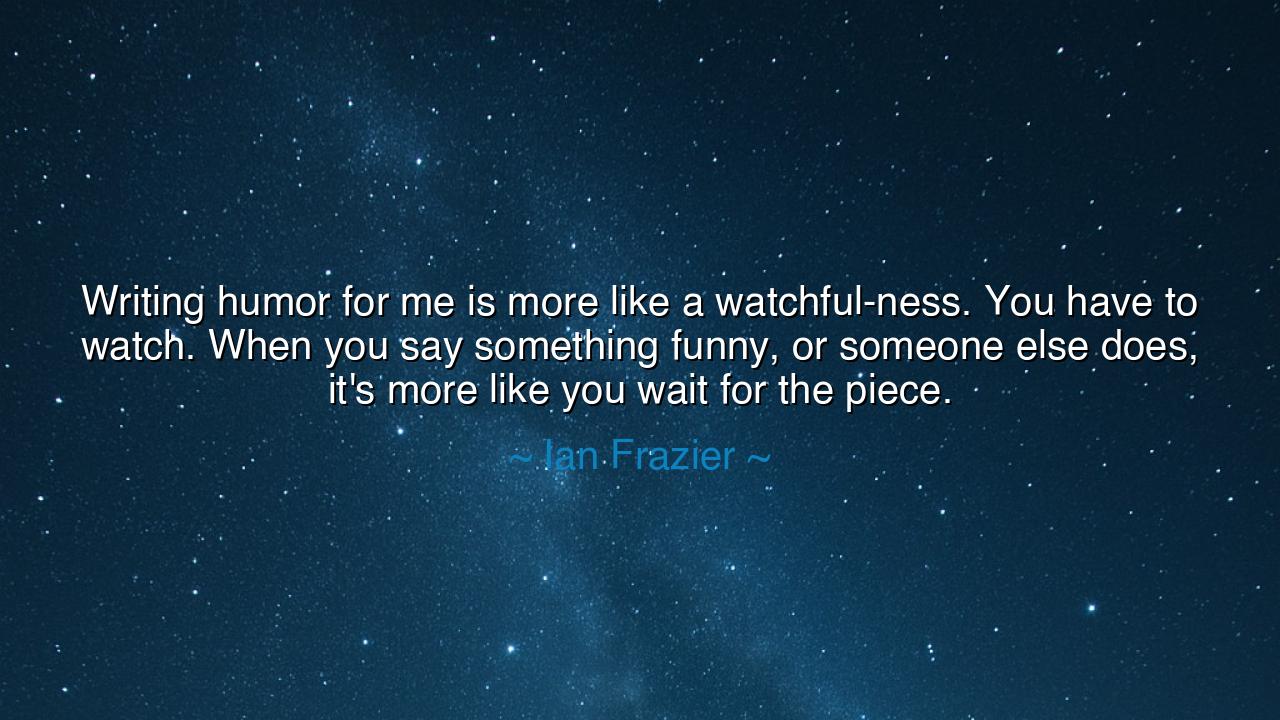
Writing humor for me is more like a watchful-ness. You have to
Writing humor for me is more like a watchful-ness. You have to watch. When you say something funny, or someone else does, it's more like you wait for the piece.






Hear the words of Ian Frazier, the gentle craftsman of laughter and truth: “Writing humor for me is more like a watchful-ness. You have to watch. When you say something funny, or someone else does, it’s more like you wait for the piece.” In these words lies a teaching deeper than the art of writing—it is a meditation on how to live, how to listen, and how to find meaning in the quiet rhythm of the world. For true humor, like all wisdom, cannot be forced. It arrives when the heart is patient and the eye is open.
The ancients would have called this watchfulness a sacred discipline. It is the practice of presence—the ability to stand still amid life’s noise and perceive what others miss. The humorist, as Frazier describes, is not a magician conjuring laughter from nothing; he is a watcher of men and moments. He studies gestures, silences, contradictions, and truths hidden in plain sight. When he finally speaks, it is not invention but revelation. He has seen life unfold and simply holds up the mirror. Humor, then, becomes a kind of wisdom—a light that exposes human folly not with cruelty, but with tenderness.
The philosopher Socrates once walked through Athens pretending ignorance, asking foolish questions until the proud and learned exposed their own contradictions. He was, in his way, the first humorist—a man who understood that truth and comedy spring from the same soil of awareness. His laughter, though subtle, carried power. Like Frazier’s watchful writer, Socrates did not hurry to teach or judge. He observed, waited, and allowed men to reveal themselves. The laughter that followed was not mockery—it was the music of awakening. So too does the writer who waits for “the piece” learn to hear when life itself begins to speak.
This waiting—this sacred patience—is at the heart of every art. The painter waits for light to settle upon his canvas. The philosopher waits for silence to birth a thought. The humorist waits for the world to reveal its own absurd grace. For the truth is that life, left to itself, is full of comedy. A king slips upon the marble of his own throne; a scholar forgets his words at the moment of triumph; a beggar speaks wisdom while the wealthy look away. These moments, caught by the watchful, become the timeless essence of humor—the reminder that even our solemn lives are woven with laughter from the gods.
Consider the story of Mark Twain, that river-born philosopher of America. He spent his youth not inventing jokes, but watching—watching the waters flow, the people quarrel, the merchants boast, the preachers lie, and the children dream. He once said that the secret of his writing was simple: “All you need to do is look around and tell what you see.” In that way, Twain and Frazier share a lineage of wisdom. They both knew that the world is already funny; the writer need only be awake enough to notice it. The best humor is not clever—it is honest. It comes not from the mind’s invention but from the soul’s recognition.
Frazier’s words also whisper a deeper truth: that laughter is born from humility. The watchful person does not place himself above others; he sees himself as part of the same human comedy. He laughs at his own missteps, his own contradictions, his own fragile condition. In doing so, he frees himself from pride. To “wait for the piece” is to admit that inspiration comes not from control, but from surrender. It is to stand open before the world and say, “Teach me. Surprise me. Let me see.” The humor that follows is not performance—it is grace.
Therefore, let this teaching be passed down: be watchful in your life. Do not rush to speak, to judge, to fill the silence. Learn to look upon the world as a patient observer, for life will always reveal its laughter to those who wait. When you witness contradiction, do not scorn it—smile at it. When you see folly, do not mock it—understand it. When you stumble, laugh and rise again, for in that laughter lies freedom.
For as Ian Frazier teaches, the writer—and indeed every human being—must learn to wait for the piece. Whether you are crafting a story, living a life, or searching for meaning, remember this: truth comes to those who are still enough to see it. Let your heart be patient, your eyes open, and your spirit light. Then, when laughter arrives, it will not be mere amusement—it will be revelation, a moment when the soul recognizes itself and rejoices in the wonder of being alive.






AAdministratorAdministrator
Welcome, honored guests. Please leave a comment, we will respond soon